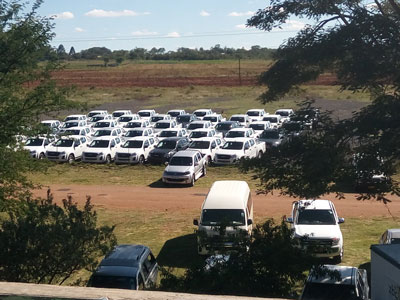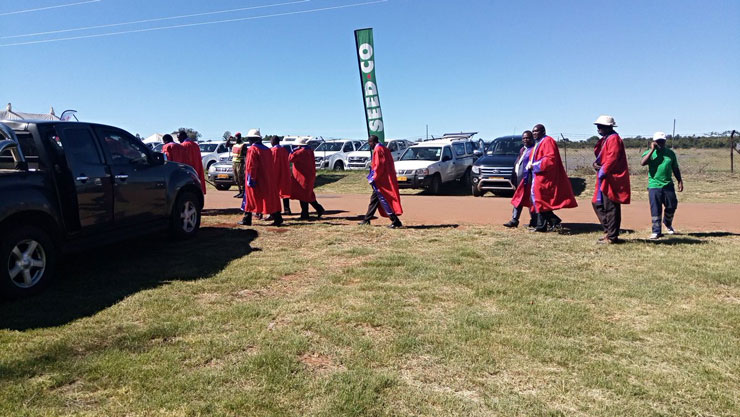
President Emmerson Mnangagwa on 13 January was in Gweru about 271 kilometers west of Harare where was holding a meeting with 226 Chiefs from around the country. At the occasion, Mnangagwa personally handed the first batch of 52 cars to some of the Chiefs; distributed in terms of seniority. This has not gone done well with some opposition figures notably former Education minister who wrote on his twitter handle: “If ZANUPF are so confident of victory and if the MDC Alliance is so clueless why does the ruining party still feel it necessary to bribe Chiefs, maintain its monopoly over ZBC, Herald, ZEC? If they are so electable just comply with the Constitution!”
Voter buying is not a new phenomenon, stands, food, farming implements and other goodies are now know to be used as a carrot and stick measure towards every election. The allocation of cars to Chief is probably an introduction of what lies ahead especially that now we are we are nearing the 2018 general elections. The issue of vehicles for Chiefs has been outstanding for several years with some having allocated cars a few years ago and others promised that their allocation was on their way like what happened today. Unfortunately the last time this happened, the allocation for the remaining Chiefs never come. One may question why didn’t they give the Chiefs the cars long back? Why now ahead of elections.

A Newsday (26 August 2016) article titled: “Corruption, vote-buying rampant ahead of polls,” noted that “an analysis of previous elections from the year 2000 to 2015 shows that public resources are dished out during election campaigns and these include land, food, jobs and livelihood opportunities, mining opportunities, access to cheap loans and credit lines and housing stands.
One does not need to be a rocket scientist to understand that the motive of the hand-outs is to deceive and buy votes and nothing else. The timing speaks volumes about the intention to buy votes.” The article goes on to say that “previous cases have also shown that the electorate has also been duped. In the Norton by-election the youth were promised “heaven on earth”. The promises were televised, but not yet fulfilled.”
The Norton Member of Parliament buy-election which took place in 2017 resulted in the ruling ZANU-PF losing to independent candidate Temba Mliswa despite reports suggesting that at least 7,000 stands had been allocated to youths as a form of voter buying disguised as providing youths with a place to stay.
This occasion is the latest edition to an already electoral playing field heavily populated with individuals who are confusing the electorate and buying their votes ahead of the 2018 harmonized elections. This behavior is deplorable and unpardonable to say the least. Voter buying is not a phenomenon peculiar to Zimbabwe.
In Kenya last year towards the repeat presidential poll on 16 October, opposition NASA women leaders protested against “massive buying of national Identity cards” from their supporters. The eight legislators who took part in the protest said that it was a well orchestrated scheme to disfranchise their candidate Raila Odinga who went on to lose the election after having pulled out of the race. The situation was also widely reported before the August 2017 polls where across all political parties, most aspirants were accused of giving voters a lot of money from undisclosed sources, with the express purpose of buying leadership solely for selfish or enrichment reasons after winning the election.
According to a Mail and Guardian (23 May 2016) article titled: “Voters condemn food parcels during election campaigns,” In South Africa “a CSDA report, published in 2014, found that 70% of voters in the three selected wards equated the handing out of food parcels before an election to ‘vote buying’. This suggests that most voters disapprove of handing out of food parcels before an election. Only 27% of those that participated in the study thought that people are more likely to vote for a political party because of food parcels”.
According to Stokes (2007b:96, Jensen and Justesen 2014), the undemocratic nature of vote buying arises precisely because “… it keeps vote sellers from having their interests accurately interpreted and made known, and in that it makes them less autonomous than are the recipients of politically motivated public programs.” This tends to weaken or even reverse the accountability link between voters and politicians (Stokes, 2005, 2007b).
What happened in Zimbabwe on 13 January an example of the perpetuation of voter buying that is rampant through the world. A cancer which voters should fight through refusing hand outs which usually only come weeks or months before an election. The question which most observers will be asking is whether the president has officially introduced voter buying through the Chiefs ahead of the harmonized elections expected in July/August this year?
This election is important in that the ruling ZANU-PF is out to legitimize their rule after questions were raised over the ascendancy of Mnangagwa after the military coup last November which led to the resignation of long time ruler Robert Mugabe hours after impeachment processes were underway.

References
- Jense and Justesen, 2014. Poverty and vote buying: Survey-based evidence from Africa. Available from: https://www.researchgate.net/publication/259992513_Poverty_and_vote_buying_Survey-based_evidence_from_Africa [accessed Jan 13 2018].
Leave a Reply